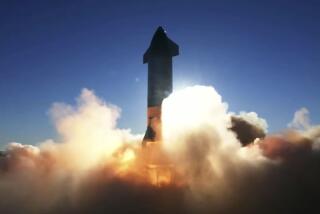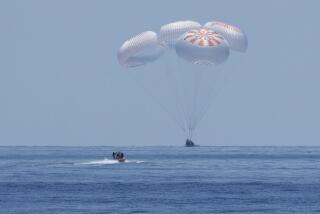Firm Designs Possible Heater for O-Rings : Anaheim Company Sees Strip as Possibility for Space Shuttle Use
- Share via
An Anaheim company has designed an electric heating strip made from a revolutionary mixture of rubber, silicon and fiberglass that has been tested as a possible cure for cold weather damage to critical seals on the space shuttle’s solid rocket boosters.
AOV Industries Inc., which makes flexible heaters and high-temperature furnaces used in the aircraft industry, modified its previously developed heating strips for use in warming the O-rings on the boosters and thus preventing their contracting in cold weather.
It was leaking O-rings that were blamed for the explosion of the Challenger in January. Cold weather the morning of the launch is believed to have caused a contraction of the rings that seal the three sections of the solid rocket boosters.
“The (strip heater) technique seems to have some promise,” said Rocky Raab, a spokesman for Morton Thiokol Inc., the Promontory, Utah-based company that builds the solid rocket booster casings under a contract from the National Aeronautics and Space Administration.
Includes Heating Unit
Raab said that if used, the strips would go on the outside of the booster just above the joints. The rubberized compound, in which is embedded a heating element, would be covered with insulation and rainproofing, Morton Thiokol said.
NASA in August completed a $300-million redesign of the faulty solid rocket joint that caused the explosion and deaths of the seven people aboard. NASA officials said in August that external heaters are one of numerous modifications that probably will be incorporated in the redesigned booster.
AOV’s heating strips were first designed to form and cure epoxy patches on advanced aircraft, which increasingly are made of composite materials.
AOV said it anticipates bidding on a production contract for the heaters if NASA decides to incorporate the heaters in the redesigned rocket.
“It would be a prestigious assignment,” said Steve Grant, AOV’s vice president. “It would mean a lot toward putting our company on the map.”
From a practical standpoint, however, Grant said such a contract may not have great value, partially because of the enormous paperwork requirements in bidding on government contracts.
AOV had 1985 sales of $3.5 million and expects 1986 sales of about $4.5 million, Grant said.
More to Read
Inside the business of entertainment
The Wide Shot brings you news, analysis and insights on everything from streaming wars to production — and what it all means for the future.
You may occasionally receive promotional content from the Los Angeles Times.









